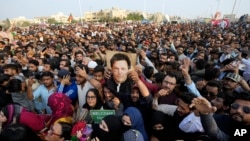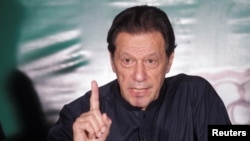Pakistan's Supreme Court has upheld an electoral commission decision barring the party of jailed former Prime Minister Imran Khan from using its iconic cricket bat electoral symbol to identify party candidates contesting the Feb. 8 national election.
The decision has been criticized by his party as an effort to keep it off next month’s ballot.
The caretaker government of Anwaar-ul Haq Kakar has distanced itself from the election commission's decisions, repeatedly stating that it does not want to comment on the working of a constitutionally autonomous institution.
The top court announced the verdict in a live telecast Saturday. It endorsed a controversial Election Commission decision prohibiting Pakistan Tehreek-e-Insaf, or PTI, from retaining the bat symbol, citing alleged irregularities in recent internal party elections. The party had appealed the commission’s decision to the Supreme Court.
Election symbols are essential campaign tools to identify candidates on ballot papers in the nation of about 241 million people, where most constituencies are in rural areas with low adult literacy rates.
Khan, a cricket hero-turned-prime minister, was removed from office through a parliamentary no-confidence vote in April 2022. The 71-year-old deposed leader has since directly accused Pakistan’s powerful military of being behind the toppling of this government and an ensuing nationwide crackdown on his party to keep it out of the election race.
"PTI cannot go into elections as a party, due to be held February 8 this year. This (court ruling), by far, is the worst decision impacting millions of voters of a party that enjoys the most popular public support. A sad day for democracy," a party statement said in response to Saturday's court ruling.
Michael Kugelman, the director of the South Asia Institute at Washington's Wilson Center, noted that the 2018 elections, which the PTI won, were marred by preelection rigging. He said issues surrounding the integrity of this year’s elections persist.
"PTI leaders jailed. PTI electoral candidates' nomination papers denied. PTI online rallies/fundraisers blocked…PTI denied [the] use of [the] election symbol. This is brazen, not subtle, pre-polls rigging," Kugelman said on X.
The PTI said that despite being stripped of its iconic bat symbol, its candidates would still contest the vote as independents, using individual symbols. Observers cautioned it would likely confuse voters and benefit rival party candidates eventually.
"Excluding a major political party from elections on technical grounds will destabilize democracy. With this decision, the transparency of the general elections in 2024 is likely to become more controversial," said the independent Human Rights Council of Pakistan in a statement following the Supreme Court decision.
Lawyer Jibran Nasir, a human rights activist and an independent election candidate, said winning PTI candidates would be vulnerable to state pressure and financial and political bribes to join other parties for personal gain.
"This, most regrettably, is equivalent to disenfranchising tens of millions of voters across Pakistan," he said on X.
Nasir and other prominent legal experts said, citing constitutional provisions, that the election commission could not use intra-party elections to overrule the right to form and operate a political party and the right of Pakistanis to vote for a party of their choice.
"It is a huge blow to our fundamental rights jurisprudence regarding political parties + political participation," Reema Omer, the legal South Asia adviser at the Geneva-based International Commission of Jurists, wrote on X, formerly known as Twitter.
Muddassir Rizvi is with the Islamabad-based independent Free and Fair Election Network, which works to promote democratic practices in the country. Rizvi noted that controversies have always marred national elections.
"We always consider that all political actors should be part of the electoral [process] and keeping one political party out of the contest for one reason or another will raise many questions on the legitimacy of the exercise," Rizvi told VOA.
In an editorial Sunday, the country's prestigious English-language DAWN newspaper denounced the Supreme Court for upholding what it said was a "deeply controversial" Electoral Commission decision. The editorial went on to say, "One also wonders what the general impact of this decision will be on how 'free and fair' the upcoming elections are publicly perceived to be."
Khan was convicted and sentenced to three years last August on charges of corruption, leading to his disqualification from running for public office for five years. Most senior PTI leaders have also been in detention or in hiding to avoid arrest. But, according to public opinion polls, Khan remains the most popular political figure, with his party rated as the most significant national political force.
Since his ouster, authorities have launched scores of cases against the former Pakistani leader, ranging from murder to leaking state secrets and corruption. Khan denies any wrongdoing and maintains the military is punishing him and his party for pushing for an independent foreign policy.
His main rival and former three-time prime minister, Nawaz Sharif, who returned to Pakistan from self-imposed exile last October, is alleged to have secured the military's backing and was eventually cleared of all graft lawsuits.
Sharif and his party have been largely silent about the allegations but have supported the decision to strip the PTI of its electoral symbol.
Last week, a controversial Supreme Court ruling also removed a lifetime ban on Sharif, enabling him to contest the polls in his bid to become prime minister for a record fourth time.
The army says it is "apolitical," but has not challenged prime-time pro-military talk show hosts and political commentators who routinely claim on television and through newspaper articles that Khan's removal from office and the ensuing political developments are directed by "the establishment," a term used to refer to the military.
Generals staged several coups against elected governments and ruled Pakistan for more than three decades since it gained independence from Britain in 1947. They influence the making or breaking of elected governments when not in power, say Pakistani political parties and former prime ministers, including Sharif and Khan.
In November 2022, then-army chief Qamar Javed Bajwa, for the first time, acknowledged in a nationally televised speech that his institution's decades of meddling in national politics were to blame for increasing criticism of the military in recent years.





